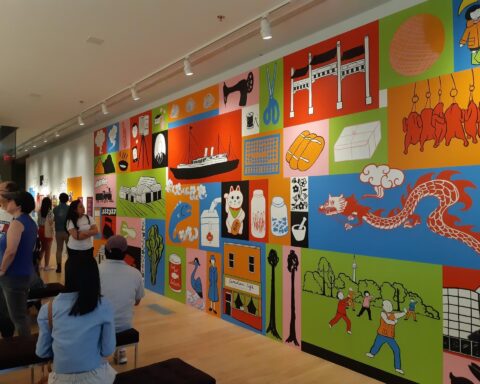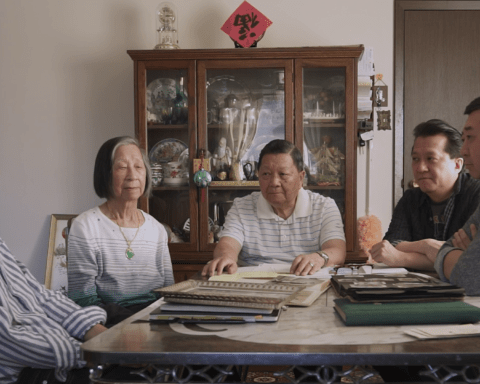As Canada gears up for the 2015 federal election on October 19, the Conservative Party of Canada has launched a Chinese-language website as a strategic move to win the Chinese vote.
But although the site attempts to speak to issues that will affect Chinese-Canadians, members of the community say that they’re not swayed by the party’s tactics.
Melissa Fong, a Ph.D. candidate in geography at the University of Toronto, says that while she agrees that different languages should be represented in political parties’ platforms, she sees the website as being “really more about pandering to votes than content.”
The website, which includes a statement by multiculturalism minister Jason Kenney translated in Chinese, mentions the Conservatives’ history of serving Chinese communities.
She sees the website as being “really more about pandering to votes than content.”
Such examples include the Conservatives having the first Chinese-Canadian Member of Parliament in 1950 (Douglas Jung) and when Prime Minister Stephen Harper apologized for the head tax imposed on Chinese immigrants in 1885.
“The overall tone feels like the Conservative government is attempting to “guilt trip” Chinese voters to vote for their party based on those past deeds which were intended to strengthen relations between the government and the Chinese community,” says Calvin Tsang, a 23-year-old social work student from Toronto.
The effectiveness of the site
While she says having a website dedicated to the Chinese may be enough to get votes, Avvy Go, the clinic director of the Metro Toronto Chinese and Southeast Asian Legal Clinic, hopes that voters will choose a government that will take leadership on issues that will affect their day to day lives.
“[The website’s] not about speaking to a particular issue the community is concerned about. Like for instance, how are we going to address unemployment rate amongst the Chinese? How do you ensure newcomers have their international training accredited in Canada?” she says.
“I think right now, the parties either ignore us or they use tactics such as reflected in the Conservative website and try to play up superficial kinds of things as opposed to trying to address issues that really impact our community.”
For Fong, the recent government’s policies say more than the creation of a website ever could.
“The Conservatives are not good for racialized Canadians, not good for newcomers and not good for people of colour,” Fong says, giving mention to the Conservatives’ focus on the niqab, Anti-terrorism Act, second-tier citizenship and Harper’s recent reference to “old stock Canadians.”
She continues, “If they really cared about people of colour, Chinese voters, it would be demonstrated in the policy.”
But strategies like the Conservatives’ website are not new in the world of politics. According to Nelson Wiseman, the director of the Canadian Studies program at the University of Toronto, ethnic communities have always been targeted with specific messages for them.
“If they really cared about people of colour, Chinese voters, it would be demonstrated in the policy.”
Having a Chinese-language website doesn’t mean it will have an impact on how the Chinese will vote, he explains.
“Let’s say you’re Chinese and on the Internet. Why should you go to that site? There are an infinite number of sites that you can go to. Just because anybody can put anything they want on the Internet, it doesn’t mean it captures any eyeballs,” he says.
The Conservatives have targeted the Liberals and the New Democrats on their website, but members of the latter parties agree that it detracts from discussing issues important to immigrants such as the economy and the well-being of their families.
Arnold Chan, who’s defending his seat as a Liberal MP in the Scarborough-Agincourt area, says he feels the Conservatives’ Chinese-language website is just another example of the party’s divisive campaigning.
“At the end of the day, it looks like this is a desperate measure by a desperate team,” he says. “This is part of a continuing narrative of negative campaigning.”
Olivia Chow, who’s running for a seat in the Spadina-Fort York area as an NDP, wouldn’t speak much on the subject.
In an e-mail statement, a member of her campaign wrote, “Like many Conservative tactics, it distracts from important discussions like affordable childcare, protecting the environment, and investing in transit.”
The Conservatives, who have 10 Chinese people running for office, could not be reached for comment after multiple requests to speak with several of their candidates.*
Real engagement with Chinese-Canadian communities
But while the accessibility of language is important in a diverse country such as Canada, having a website isn’t enough to educate the Chinese to be politically involved, according to Fong.
She stresses the importance of parties hiring people that can communicate in different languages.
“I think it’s really important for representatives to hire people that speak multiple languages, and not expect it of people that they should know English or French. Canada was founded on many more languages than English and French.”
Organizations such as the Chinese Canadian National Council (CCNC) also offer programs such as the civic literacy project, which educate participants about the election process, how governments work and how to engage the community through civic engagement activities.
Chase Lo, the executive director at the CCNC’s Toronto chapter, says the group even holds field trips to local MPs’ offices within the Scarborough-Agincourt area so people can ask questions directly about specific election issues.
In doing so, he says he hopes he can help ethnic communities such as the Chinese go out and vote.
“People have the choice to be involved and […] their voice matters,” he says. “If they want to see change, if they want to see that there’s injustice in terms of how things are operating, they have the power to be able to come together with other people and influence some change.”
*Requests for comment were made to Conservative candidates Bin Chang, Alice Wong and Andy Wang.




